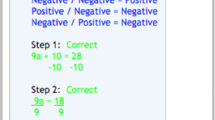Abstract
Studies have proven that providing on-demand assistance, additional instruction on a problem when a student requests it, improves student learning in online learning environments. Additionally, crowdsourced, on-demand assistance generated from educators in the field is also effective. However, when provided on-demand assistance in these studies, students received assistance using problem-based randomization, where each condition represents a different assistance, for every problem encountered. As such, claims about a given educator’s effectiveness are provided on a per-assistance basis and not easily generalizable across all students and problems. This work aims to provide stronger claims on which educators are the most effective at generating on-demand assistance. Students will receive on-demand assistance using educator-based randomization, where each condition represents a different educator who has generated a piece of assistance, allowing students to be kept in the same condition over longer periods of time. Furthermore, this work also attempts to find additional benefits to providing students assistance generated by the same educator compared to a random assistance available for the given problem. All data and analysis being conducted can be found on the Open Science Foundation website (https://osf.io/zcbjx/).
Access this chapter
Tax calculation will be finalised at checkout
Purchases are for personal use only
Similar content being viewed by others
Notes
References
Adams, D.M., et al.: Using erroneous examples to improve mathematics learning with a web-based tutoring system. Comput. Hum. Behav. 36, 401–411 (2014). https://doi.org/10.1007/978-3-030-52240-7_69
Feng, M., Heffernan, N.T.: Informing teachers live about student learning: reporting in the assistment system. Technol. Instr. Cogn. Learn. 3(1/2), 63 (2006)
Heffernan, N.T., Heffernan, C.L.: The ASSISTments ecosystem: building a platform that brings scientists and teachers together for minimally invasive research on human learning and teaching. Int. J. Artif. Intell. Educ. 24(4), 470–497 (2014). https://doi.org/10.1007/s40593-014-0024-x
Lee, J.: Cumulative Learning and Schematization in Problem Solving. Universität Freiburg (2012)
McLaren, B.M., van Gog, T., Ganoe, C., Karabinos, M., Yaron, D.: The efficiency of worked examples compared to erroneous examples, tutored problem solving, and problem solving in computer-based learning environments. Comput. Hum. Behav. 55, 87–99 (2016)
Patikorn, T., Heffernan, N.T.: Effectiveness of crowd-sourcing on-demand assistance from teachers in online learning platforms. In: Proceedings of the Seventh ACM Conference on Learning @ Scale, L@S 2020, pp. 115–124. Association for Computing Machinery, New York (2020). https://doi.org/10.1145/3386527.3405912
Prihar, E., Botelho, A.F., Jakhmola, R., Heffernan, Neil T.I.: ASSISTments 2019–2020 school year dataset, December 2021. https://doi.org/10.17605/OSF.IO/Q7ZC5
Prihar, E., Gonsalves, M.: ASSISTments 2020–2021 school year dataset, November 2021. https://osf.io/7cgav
Prihar, E., Patikorn, T., Botelho, A., Sales, A., Heffernan, N.: Toward personalizing students’ education with crowdsourced tutoring. In: Proceedings of the Eighth ACM Conference on Learning @ Scale, L@S 2021, pp. 37–45. Association for Computing Machinery, New York (2021). https://doi.org/10.1145/3430895.3460130
Razzaq, L.M., Heffernan, N.T.: To tutor or not to tutor: that is the question. In: AIED, pp. 457–464 (2009)
Whitehill, J., Seltzer, M.: A crowdsourcing approach to collecting tutorial videos-toward personalized learning-at-scale. In: Proceedings of the Fourth (2017) ACM Conference on Learning@ Scale, pp. 157–160 (2017)
Wood, D., Bruner, J.S., Ross, G.: The role of tutoring in problem solving. Child Psychol. Psychiatry Allied Discip. 17(2), 89–100 (1976)
Acknowledgements
We would like to thank the NSF (e.g., 2118725, 2118904, 1950683, 1917808, 1931523, 1940236, 1917713, 1903304, 1822830, 1759229, 1724889, 1636782, & 1535428), IES (e.g., R305N210049, R305D210031, R305A170137, R305A170243, R305A180401, & R305A120125), GAANN (e.g., P200A180088 & P200A150306), EIR (U411B190024 & S411B210024), ONR (N00014-18-1-2768), and Schmidt Futures. None of the opinions expressed here are that of the funders. We are funded under an NHI grant (R44GM146483) with Teachly as a SBIR.
Author information
Authors and Affiliations
Corresponding author
Editor information
Editors and Affiliations
Rights and permissions
Copyright information
© 2022 Springer Nature Switzerland AG
About this paper
Cite this paper
Haim, A., Prihar, E., Heffernan, N.T. (2022). Toward Improving Effectiveness of Crowdsourced, On-Demand Assistance from Educators in Online Learning Platforms. In: Rodrigo, M.M., Matsuda, N., Cristea, A.I., Dimitrova, V. (eds) Artificial Intelligence in Education. Posters and Late Breaking Results, Workshops and Tutorials, Industry and Innovation Tracks, Practitioners’ and Doctoral Consortium. AIED 2022. Lecture Notes in Computer Science, vol 13356. Springer, Cham. https://doi.org/10.1007/978-3-031-11647-6_5
Download citation
DOI: https://doi.org/10.1007/978-3-031-11647-6_5
Published:
Publisher Name: Springer, Cham
Print ISBN: 978-3-031-11646-9
Online ISBN: 978-3-031-11647-6
eBook Packages: Computer ScienceComputer Science (R0)





